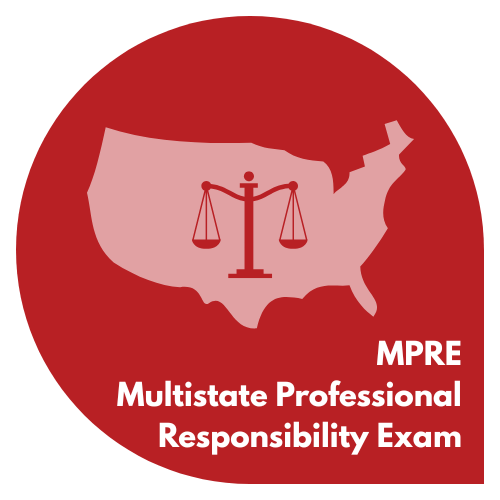Multistate Professional Responsibility Exam Practice Test
NCBE MPRE
Use the form below to configure your Multistate Professional Responsibility Exam Practice Test. The practice test can be configured to only include certain exam objectives and domains. You can choose between 5-100 questions and set a time limit.

Multistate Professional Responsibility Exam Information
The Multistate Professional Responsibility Examination (MPRE), administered by the National Conference of Bar Examiners (NCBE), is a vital step on the path to becoming a licensed attorney in the United States. Although often overshadowed by the more comprehensive bar exam, the MPRE plays a role in ensuring that prospective lawyers understand the ethical and professional responsibilities associated with legal practice. Whether you’re a law student planning ahead or a candidate preparing to sit for the test, understanding the MPRE’s purpose, format, and significance can help demystify the process and enhance your readiness.
What Is the MPRE and Why Does It Matter?
The MPRE is designed to measure a candidate’s understanding of established standards related to a lawyer’s professional conduct. It is not a test of state-specific ethics rules but is based largely on the American Bar Association’s (ABA) Model Rules of Professional Conduct and the ABA Model Code of Judicial Conduct. These frameworks form the basis of legal ethics in nearly every U.S. jurisdiction, making the MPRE a universal assessment of a lawyer’s professional responsibility.
Most jurisdictions require a passing MPRE score as a prerequisite to sitting for the bar exam or gaining admission to the bar. Only Wisconsin and Puerto Rico currently waive this requirement, and California and Maryland have their own standards. Because professional ethics are at the heart of the legal profession—where client trust, judicial integrity, and fair representation are paramount—the MPRE ensures that all aspiring attorneys have a baseline understanding of these principles before practicing law.
Who Should Take the MPRE and When?
The MPRE is typically taken by law students after they have completed a course in Professional Responsibility, often during their second or third year of law school. While there are no formal prerequisites in terms of coursework, having a solid foundation in the ethical rules and legal standards that govern professional conduct is strongly recommended before sitting for the exam.
Each jurisdiction sets its own deadline for when the MPRE must be passed in relation to the bar exam, so timing is crucial. For many, taking the MPRE at least a year before the bar exam offers peace of mind and allows time to retake it if needed. Since it is offered three times per year—in March, August, and November—students have flexibility in scheduling the exam around their studies and internships.
MPRE Format and Structure
The MPRE consists of 60 multiple-choice questions, 50 of which are scored and 10 unscored pretest items used to evaluate future questions. Test takers have two hours to complete the exam, and it is administered digitally at Pearson VUE testing centers nationwide.
Questions cover a variety of ethical scenarios and may involve judges, prosecutors, defense attorneys, and law firm settings. The key topics tested include:
- Regulation of the Legal Profession
- Client-Lawyer Relationship
- Conflicts of Interest
- Competence, Legal Malpractice, and Civil Liability
- Litigation and Other Advocacy Duties
- Client Confidentiality
- Judicial Conduct
While the questions are multiple-choice, they often involve nuanced fact patterns that test an individual’s judgment and ability to apply rules appropriately. For this reason, memorization of rules alone is not sufficient—understanding context and how rules interact is critical.
MPRE Scoring and Passing Requirements
MPRE scores range from 50 to 150, with the national median score typically falling around 100. Each jurisdiction sets its own passing score, usually between 75 and 86. For example, New York and California require a minimum passing score of 85, while some states require only 75.
Scores are scaled based on question difficulty, meaning that a raw score of correct answers is adjusted depending on the test version’s complexity. This ensures fairness across different administrations of the exam.
It’s important to note that jurisdictions generally require a candidate to achieve a passing MPRE score within a specific time frame relative to their bar application. Failing to meet this requirement can delay bar admission even if a candidate passes the bar exam itself.